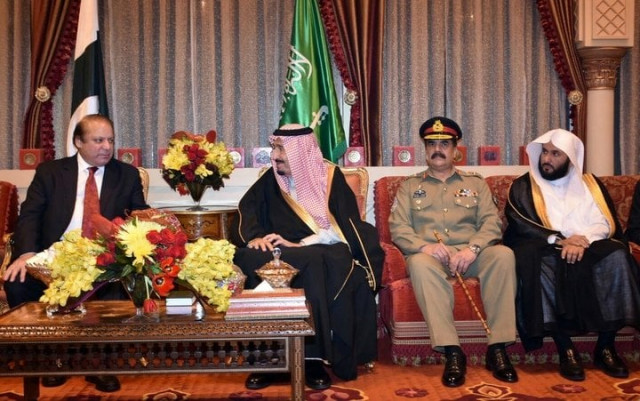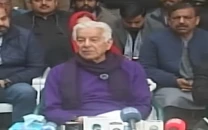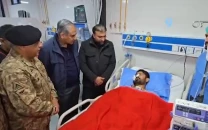How can Pakistan be an effective mediator between Saudi Arabia and Iran
Riyadh and Tehran have presently reached the highest level of tension since the Iran-Iraq war

PHOTO: PID
It’s no Cuban missile crisis yet. However, Riyadh and Tehran have presently reached the highest level of tension since the Iran-Iraq war. Prior to January 3, the two nations had severed diplomatic relations from 1988 to 1991. Both the countries maintained a working relationship through embassies even during the reign of high-pitched Ahmadinejad.
With the United Nations lifting nuclear-related sanctions against Iran, this is the best and also the worst time for mediation. While on the one hand patriotic feelings are high in Iran, wariness is at its peak in the Saudi-led camp.
After declaring its support for Saudi Arabia’s security, Pakistan seems to have no obvious diplomatic capital to the credit of the country’s establishment with Iran. Like Riyadh, Tehran under the Shah used to be Islamabad’s strategic ally. The story with post-revolution Iran has been an altogether different one. Ever since, there have been tremendous highs and moderate lows in mutual suspicion.
Saudi-Iran rift weakening Muslim ummah: Army chief
Confidence-building measures that Pakistan can propose
Only idealists can expect bilateral relations to improve substantially in the near future. Pragmatism requires urgent adoption of a few confidence-building measures aimed at avoiding an all-out war between Iran and Saudi Arabia.
1. Last March, Saudi Arabia had proposed to Iran the formation of a joint security committee to look into issues of mutual concern. Tehran did not out-rightly reject the idea but events in Syria and Yemen obstructed serious interaction between the two rivals. Establishment of such a forum will provide some form of mechanism for bilateral engagement on thorny issues.
2. Diplomacy should be given a chance and officials on both sides should exercise extreme restraint in engaging in informal means of communication to convey messages. So far social media or press have been abundantly used to hurl threats and insult the other’s leadership, people and beliefs.
3. Both the countries need a bare minimum communication channel to avert an accidental war. Then, an insubordinate hyper-nationalistic military officer, naval commander or fighter pilot attacking the other won’t be considered an attack by the rival country.
4. The two capitals must inform each of naval, air and land exercises in advance. The enemy normally perceives build-up of military personnel and other assets as groundwork for attack. The degree of mistrust lessens once intentions are clearly expressed through an official notice.
Saudi-Iran rift: Fear of sectarian fallout prompted mediation, say officials
5. Both must agree on a moratorium on execution of the other’s citizen who might be already in jail and sentenced or spies arrested after the events of January 2.
6. The OIC can form a panel of foreign ministers for negotiation in a third, neutral country. The direct talks held in the presence of a select team of foreign ministers from Muslim countries can be held in Switzerland, Norway or Germany. Oman, which has traditionally been neutral in Saudi-Iran tensions, can also host such negotiations.
The end result
Even if the above-proposed steps are taken, there are enormous risks of provocations and escalation of conflict. Challengingly, such sources of incitements are beyond the official control of either capital. Short of starting a direct war, one or both the sides have been engaged in proxy wars in Yemen, Bahrain, Iraq, Syria and Lebanon. If Saudi-led alliance is attacking the Houthis in Yemen, Iranian troops and funded militias are fighting on behalf of Bashar al-Assad in Syria.
The atmospherics will worsen if the fighting in Yemen does not seize and the opposing sides refuse to freeze their advance. In case of conflict, both sides are mutually vulnerable. None can act arbitrarily and get away without a matching or stunning response. Thus, tit-for-tat response can deter the use of military might.
PM Nawaz, army chief head to Saudi, Iran to mend rift
Iran and Saudi Arabia have economic interest in reducing the tension while continuing their proxy wars in the region. Tehran has just been cleared of nuclear-related sanctions while Riyadh is facing serious fiscal deficit due to its over-production of oil in the global market. Neither can afford a bitter cold war, which will eventually have domestic implication detrimental to the status quo.
Iraq can play a vital role of a balancer in the game of oil. Saudi Arabia fears that Iran with the help of Iraq will try to take control of OPEC cartel. Baghdad’s neutrality on the issue can stem a fresh source of confrontation between its two neighbours with whom it shares large borders.
Pakistan and Turkey have very limited capacity to mediate between the rival parties. Both are far from neutral. The best help Islamabad can extend will be stemming flow of proxy fighters hired for Syria, Yemen or Iraq. Moreover, Premier Nawaz and General Raheel have to come down really hard on all sources of foreign investment for various sects and their likeminded NGOs and media houses. Another valuable measure would be to stem excessive use of hateful expression on social media and in the religious gatherings.
Naveed Ahmad is a Pakistani investigative journalist and academic with extensive reporting experience in the Middle East. He is based in Doha and Istanbul. He tweets @naveed360



















COMMENTS
Comments are moderated and generally will be posted if they are on-topic and not abusive.
For more information, please see our Comments FAQ